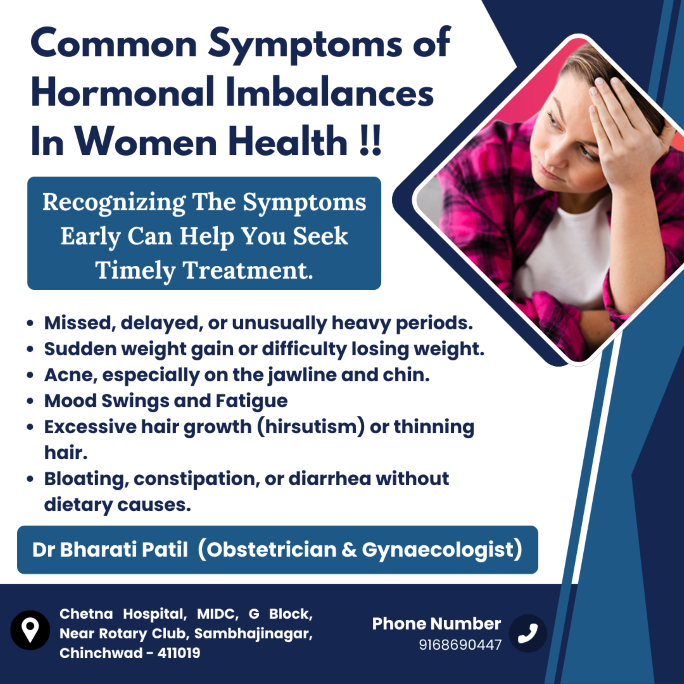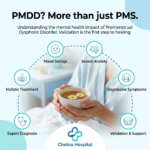Hormonal imbalances are a common yet often misunderstood aspect of women’s health. Hormones, the body’s chemical messengers, are essential for regulating vital bodily functions, including metabolism, growth, mood, and reproduction. When there is an imbalance—either an excess or deficiency of a specific hormone—it can lead to a range of symptoms that impact a woman’s physical and emotional well-being. Understanding these symptoms is crucial for early identification and effective treatment.
What Causes Hormonal Imbalances in Women?
Hormonal imbalances can occur for numerous reasons, including:
- Age-related changes: Menopause and perimenopause are common phases during which hormone levels fluctuate significantly.
- Medical conditions: Polycystic Ovary Syndrome (PCOS), thyroid disorders, and adrenal dysfunction are key contributors.
- Lifestyle factors: Chronic stress, lack of sleep, poor diet, and sedentary habits can disrupt hormonal balance.
- Medications: Birth control pills, hormone replacement therapy, and certain other drugs can alter hormone levels.
Being aware of the symptoms is essential, as they often serve as the first indicators of an underlying imbalance.
Common Symptoms of Hormonal Imbalances
1. Irregular or Absent Periods
One of the most noticeable signs of a hormonal imbalance in women is an irregular menstrual cycle. Missing periods, experiencing frequent cycles, or having especially heavy or prolonged bleeding can indicate issues with hormones like estrogen and progesterone. These symptoms are common in PCOS and other reproductive conditions.
2. Unexplained Weight Gain or Loss
Hormonal imbalances can impact metabolism, making it difficult to maintain a healthy weight. High levels of cortisol, the stress hormone, or insulin resistance associated with PCOS can lead to weight gain, especially around the abdomen. Conversely, overactive thyroid (hyperthyroidism) can lead to unexpected weight loss despite a normal appetite.
3. Chronic Fatigue
Feeling excessively tired, even after sufficient rest, may be linked to imbalances in thyroid hormones, cortisol, or progesterone. Adrenal fatigue, stemming from prolonged stress, is another potential cause of chronic exhaustion.
4. Mood Swings and Depression
Fluctuating hormone levels can have a direct impact on mood. Symptoms such as irritability, anxiety, and episodes of depression are often linked to changes in estrogen and progesterone levels. Conditions like PMDD (Premenstrual Dysphoric Disorder) or menopause often exacerbate these emotional challenges.
5. Hair Loss and Skin Issues
Androgenic hormones, which include testosterone, play a role in hair growth. Excess androgen levels can lead to thinning hair, receding hairlines, or bald patches in women. Conversely, conditions like hypothyroidism can cause hair to become brittle and fall out. Hormonal imbalances also contribute to acne, oily skin, and hyperpigmentation.
6. Hot Flashes and Night Sweats
These are hallmark symptoms of menopause and perimenopause, caused by fluctuating estrogen levels. Hot flashes—a sudden feeling of heat, often accompanied by sweating and redness—can occur during the day or night, disrupting sleep and daily activities.
7. Sleep Problems
Insomnia or trouble staying asleep is another common symptom. Hormones like melatonin, cortisol, and progesterone influence sleep cycles. Women with high stress levels often experience cortisol spikes at night, which interfere with restful sleep.
8. Digestive Issues
Hormones have a direct impact on the digestive system. Fluctuations in estrogen and progesterone can lead to bloating, constipation, or diarrhea. Chronic stress, and its impact on cortisol levels, can also contribute to gut health problems.
9. Infertility or Trouble Conceiving
Hormonal imbalances play a significant role in fertility issues. Irregular ovulation, often caused by imbalanced estrogen and progesterone levels, can make it difficult to conceive. PCOS is a primary example of a hormonal disorder leading to infertility.
10. Low Libido
Testosterone, while often thought of as a male hormone, plays a vital role in female libido. Low testosterone levels can decrease sexual desire, while imbalances in estrogen or progesterone may exacerbate the issue.
Long-Term Health Risks of Hormonal Imbalances
Untreated hormonal imbalances can lead to long-term health complications, including:
- Osteoporosis: Low estrogen levels, especially during menopause, can result in decreased bone density.
- Heart disease: Conditions like hypothyroidism and high cortisol levels can increase the risk of cardiovascular problems.
- Type 2 Diabetes: Insulin resistance, often linked to PCOS, can increase the likelihood of developing diabetes.
How to Manage and Treat Hormonal Imbalances
The good news is that hormonal imbalances can often be managed or treated effectively with appropriate lifestyle changes and medical interventions. Here’s how:
1. Medical Diagnosis and Treatment
- Consult a healthcare provider to identify the underlying cause through blood tests and diagnostic tools.
- Treatment options may include hormone replacement therapy (HRT), medications for specific conditions, or dietary supplements.
2. Lifestyle Modifications
- Healthy Diet: Focus on whole foods, rich in fiber, healthy fats, and lean proteins. Foods like flaxseeds, nuts, leafy greens, and fatty fish are particularly beneficial.
- Regular Exercise: Physical activity can help regulate hormones like insulin and cortisol.
- Stress Management: Practices like yoga, meditation, or deep breathing can reduce cortisol levels.
3. Sleep Hygiene
- Establish a consistent sleep schedule.
- Avoid caffeine or electronics before bedtime to support better hormone regulation.
4. Alternative Therapies
- Herbal remedies like ashwagandha, maca root, and evening primrose oil may support hormonal balance.
- Acupuncture has also been explored as a potential treatment to regulate menstrual cycles and reduce stress.
When to Seek Help
If you experience persistent symptoms that interfere with your quality of life, it’s essential to consult a healthcare professional. Early diagnosis and treatment can prevent complications and improve overall well-being.
Conclusion
Hormonal imbalances in women can manifest in various ways, impacting physical, emotional, and reproductive health. Awareness of the common symptoms—from irregular periods and weight changes to mood disturbances and sleep issues—is key to recognizing and addressing these imbalances. By adopting healthy lifestyle habits and seeking appropriate medical care, women can effectively manage their hormonal health and lead more balanced lives. Prioritize your health, listen to your body, and don’t hesitate to seek professional guidance when needed.













